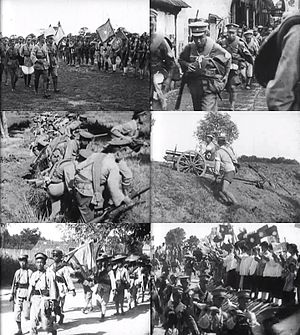Northern Expedition (1926–1928)
| Northern Expedition | |||||||
|---|---|---|---|---|---|---|---|
| Part of Warlord Era, Chinese Civil War | |||||||
 Clockwise from top-left: Chiang inspecting soldiers of the National Revolutionary Army; NRA troops marching northwards; an NRA artillery unit engaged in a battle with warlords; people showing support for the NRA; peasants volunteer to join the expedition; NRA soldiers preparing to launch an attack. |
|||||||
|
|||||||
| Belligerents | |||||||
| Commanders and leaders | |||||||
|
|
|
||||||
| Strength | |||||||
| about 250,000 | about 800,000 | ||||||
| Northern Expedition | |||||||
| Traditional Chinese | 國民革命軍北伐 | ||||||
|---|---|---|---|---|---|---|---|
| Simplified Chinese | 国民革命军北伐 | ||||||
| Literal meaning | National Revolutionary Army northern expedition | ||||||
|
|||||||
| Transcriptions | |
|---|---|
| Standard Mandarin | |
| Hanyu Pinyin | Guómín gémìng jūn běifá |
The Northern Expedition was a Kuomintang (KMT) military campaign, led by Generalissimo Chiang Kai-shek, from 1926–28. Its main objective was to unify China under its own control by ending the rule of the Beiyang government as well as the local warlords. It led to the end of the Warlord Era, the reunification of China in 1928 and the establishment of the Nanjing government.
The Northern Expedition, also known as the Northern March, began from the KMT's power base in Guangdong province. In 1925 the May 30 Movement announced plans for a strike and protest against western imperialism and its warlord agents in China. At the same time the First United Front between the KMT and the Communist Party of China (CPC) was questioned after the Zhongshan Warship Incident in March 1926. Subsequent events made Chiang Kai-shek the paramount military leader of the KMT. Although Chiang doubted Sun Yat-sen's policy of alliance with the Soviet Union and the CPC, he still needed aid from the Soviet Union, so he could not break up the alliance at that time.
...
Wikipedia
